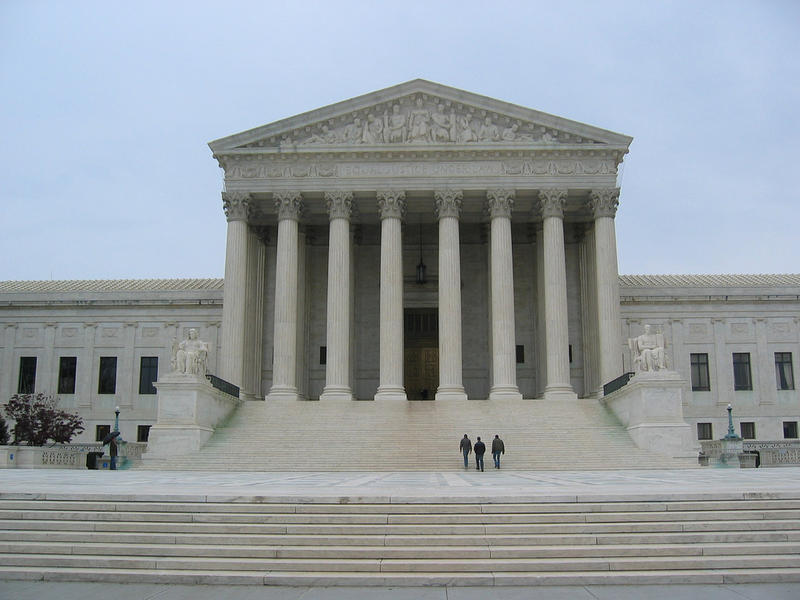Most legal scholars will agree predicting the final outcome of cases before the Supreme Court is a dicey bit of prognostication. But at the conclusion of oral arguments Wednesday, many headlines declared the court signaled support for upholding the Mississippi abortion law in question.
That prohibits abortion at 15 weeks, well before the fetal viability line set by Roe v. Wade and the series of abortion decisions decided by the high court since then.
Caroline Mala Corbin is professor of constitutional law and a dean’s distinguished scholar at the University of Miami School of Law. She told Texas Standard, “There is no question that this decision will reshape the abortion law in this country. The question is only – how much?”
Listen to the audio player or read the transcript to hear more on her analysis of Wednesday’s hearing and what could come out of it.
This transcript has been edited lightly for clarity.
Texas Standard: What were liberals emphasizing in yesterday’s arguments?
Caroline Mala Corbin: I think the liberals were emphasizing that if you are to overrule a previous case, there are certain legal boxes you have to check in order to do so in a principled way. And they kept pointing out that those reasons were not present in this case.
What about conservatives?
[Chief Justice John] Roberts seemed inclined to cut back on abortion protections, while some of the more conservative justices seemed quite keen to do away with them entirely.What made you think that Roberts wanted to cut back and not do away with the holding in Roe?
Well, under existing law, it is unconstitutional to ban abortion before viability. Viability is the point at which the fetus cannot [note: can] survive outside the woman’s uterus, and it’s roughly 24 weeks. So the current law is you cannot ban abortion at 24 weeks. Mississippi’s law banned it at 15 weeks, which is significantly earlier than 24 weeks. But Justice Roberts kept asking, “Is 15 weeks really so different from 24 weeks?”, suggesting that he was hoping to come up with some compromise provision where they would allow bans at 15 weeks, but perhaps not too much earlier than that.
Could that eliminate the viability standard?
Ever since Roe v. Wade, the court has held that it violates the Constitution to completely ban abortion before viability and, even in cases where they might have curtailed rights in other ways, they have repeatedly reaffirmed the idea that the state cannot ban abortion before that 24 week viability point. If they were to eliminate that rule, they would be eliminating the viability rule. It would be overruling all those earlier cases where they said that viability is the point at which you – you cannot ban abortion before viability.
Why do we have a viability standard in the first place?
Well, it has been the line for 50 years. And so, again, it’s worth pointing out that if the court changes its rule, it should be able to justify that change, and it’s not clear that it can. It was considered the line that best balanced the interests of both the pregnant woman and the state’s interest in fetal life. The advocate argued it’s the point at which you can think of the fetus more as a separate entity than you might otherwise do.
I think it has been said, in briefs at least, that 95% of those seeking abortions obtain an abortion before 15 weeks. Could the court come up with a standard that says the majority of women, for example, or something along those lines, or no?
No. I think what the Supreme Court would have to do is replace the existing rule with another legal standard. So again, the rule is you cannot ban abortion before 24 weeks. If that goes, then there has to be some way to measure whether a law is constitutional or not. And the law that currently exists to do that is known as the undue burden standard. So now, in evaluating a regulation of abortion as opposed to a ban on abortion, the court asks, “Will this create an undue burden? Will it create significant obstacles in the path of a woman seeking an abortion?” Because if it does, then it’s unconstitutional, and if it does not, then it is constitutional. And so what the Mississippi attorney proposed is that rule apply to all abortion regulations and bans.
Even in Mississippi itself, the state is now down to one clinic that provides abortions in the entire state. That would seem to be, on its face, an undue burden. But how did you hear Mississippi try to explain that?
Well, the problem was the undue burden standard is one you pointed out, not a lot seems to violate it, according to the Supreme Court, and that will probably be true going forward. So eliminating the current rule, which says no bans before viability, and replacing it with an undue burden standard, opens the door to many more significant regulations that the court might ultimately uphold. It’s a way of gutting protection without doing it explicitly.
There are states like Texas that have trigger laws in effect that would make abortion a felony if Roe v. Wade is overturned wholly or partly. What does that mean and how do you see that playing out?
Yeah. So there are a lot of states that have been eagerly waiting for the day that Roe v. Wade is overruled. Some states still have their old laws on the books that would cut back if Roe v. Wade is overruled in its entirety. Others have, as you mentioned, trigger laws that say if Roe v. Wade is overruled, then abortion becomes illegal again. And that’s true for about half the states in the country. I don’t know the particulars of the Texas law, but Texas is not at all alone in preparing to make abortion completely illegal or as illegal as possible in its state.
Any idea when we might hear a ruling on this case or for that matter, the previously heard case on Texas’ SB 8?
Yeah. So it would not surprise me if the Supreme Court wanted to issue both abortion rulings together, as they will be trying to devise legal standards that could address both of them. The decisions are often issued at the end of the term and could come as late as June.












